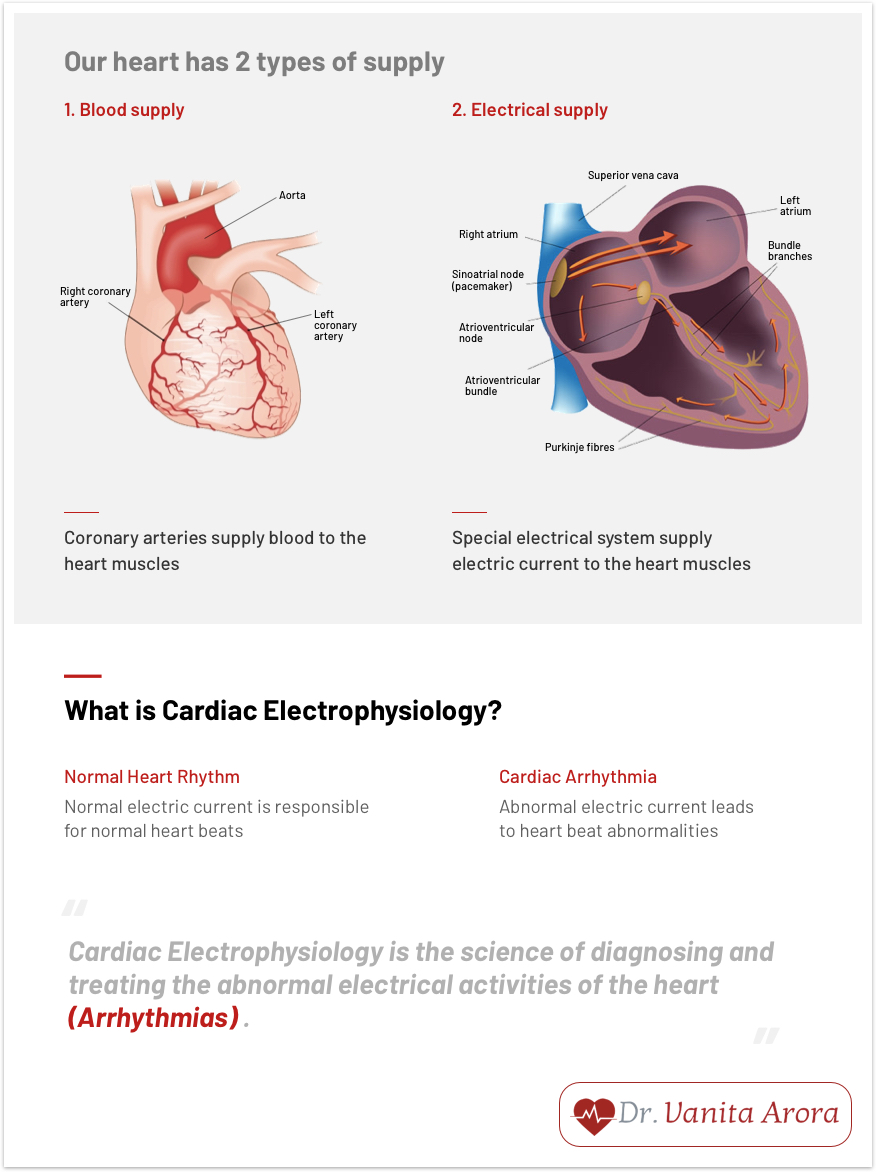What are arrhythmias?
An abnormal heart rhythm that arises due to irregularities in the heart’s electrical conduction system and associated tissues is called arrhythmia or heart rhythm disorder.
During an arrhythmia the heart rate may be abnormally slow or abnormally fast or the heart’s rhythm may be abnormally irregular.
Abnormally slow heart rhythms (usually rates below 50 beats per minute) are known as Bradycardia. They usually occur due to defects in the SA Node or the AV node. Bradycardia is very effectively treated by implantable pacemakers. These are electrical devices that are artificially stimulate the heart and prevent it from beating too slowly.
Abnormally fast heart rates (usually 150 or more beats per minute) are known as Tachycardia. These are divided into categories. Fast heart rates that begin in the upper chambers, the atria, are called Atrial Tachycardia. Fast heart rates that begin in the ventricles are called Ventricular Tachycardia (VT).
Although many types of arrhythmias are harmless, others can be extremely dangerous, even fatal. Therefore, it is important to determine the type of arrhythmia you have, established how serious it is and begin appropriate treatment for your arrhythmia.
 (Source: http://www/angelfire.com/ak3/apologia/drafts/vascular.html, https://leavingcertbiology.net/chapter-31-human-circulatory-system/)
(Source: http://www/angelfire.com/ak3/apologia/drafts/vascular.html, https://leavingcertbiology.net/chapter-31-human-circulatory-system/)
What are the signs of arrhythmia?
-
When it’s very brief, an arrhythmia can have almost
no symptoms. It can feel like a skipped heartbeat
that you barely notice.
- It also may feel like a fluttering in the chest or neck.
- When arrhythmias are severe or last long enough to
affect how well the heart works, the heart may not
be able to pump enough blood to the body. This can
cause you to feel tired, lightheaded or may make you
pass out. It can also cause death.
- Tachycardia can reduce the heart’s ability to
pump, causing shortness of breath, chest pain,
lightheadedness or loss of consciousness. If severe, it
can also cause heart attack or death.
How are arrhythmias treated?
Before cardiac arrhythmia treatment, it’s important for your doctor to
know where an arrhythmia starts in the heart and
whether it’s abnormal. An electrocardiogram (ECG or
EKG) is often used to diagnose arrhythmias. It creates
a graphic record of the heart’s electrical impulses.
Using a Holter monitor, exercise stress tests, tilt table
test and electrophysiologic studies (“mapping” the
electrical system of your heart) are other ways to find
where arrhythmias start. Treatment may include:
- Lifestyle changes
- Medicine to prevent and control arrhythmias
- Medicine to treat related conditions such as
high blood pressure, coronary artery disease and
heart failure
- Anticoagulants to reduce the risk of blood clots
and stroke
- A pacemaker to help your heart beat more regularly Cardiac defibrillation and implanted cardioverter
defibrillators (ICDs)
- Cardiac ablation
- Surgery
